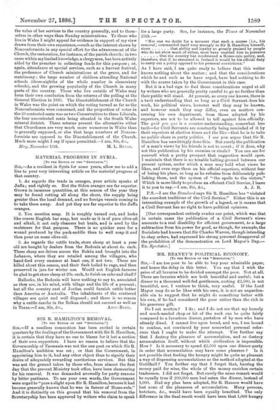SIR R. HAMILTON ' S REMOVAL.
[To Tim EDITOR 07 THE "SPECTATOR."] Sia,—If a needless commotion has been excited in certain .quarters by the dealings of the Government with Sir R. Hamilton, it is certain that they have no one to blame for it but a section of their own supporters. I have no reason to believe that the Governorship of Tasmania was not the one post on which Sir R. Hamilton's ambition was set ; or that the Government, in appointing him to it, had any other object than to signify their desire of adequately rewarding meritorious services. But this was not the ground taken by those who, from almost the first day that the present Ministry took office, have been clamouring for his removal. It was demanded avowedly for party reasons by bitter partisans. To use your own words, the Government were urged to "pass a slight upon Sir R. Hamilton, because it had become generally known that he was in favour of Home-rule." And it is distinctly on this ground that his removal from the Secretaryship has been approved by writers who claim to speak for a large party. See, for instance, the Times of November 20th :— " Nor can we doubt for a moment that each a course [i.e., his removal] commended itself very strongly to Sir H. Hamilton himself, since that ability and loyalty so greatly praised by people who do not show mach of either, must have enabled him to perceive
that the country bag condemned a Home-rule policy, and, therefore, that if he remained in Ireland it would be his official duty to carry oat a policy opposed to his personal convictions."
As I have said, I am quite ready to believe that this writer knows nothing about the matter ; and that the considerations which he and such as he have urged, have had nothing to do with the course taken by the Government in this case.
But it is a bad sign to find those considerations urged at all by writers who are generally pretty careful to go no further than their public will stand. At present, as every one knows, there is a tacit understanding that so long as a Civil Servant does his work, his political views, however well they may be known, and however much they may differ, even on matters con- cerning his own department, from those adopted by his superiors, are not to be allowed to tell against him officially. The quid pro quo is a counter-understanding, somewhat less tacit—for Civil Servants are constantly being reminded of it by their superiors at election times and the like—that he is to take no public share in party politics. I see you argue that Sir R. Hamilton has unwittingly done this. Bat surely the publication of a man's views by his friends is not to count ; if it does, why not this publication by his enemies or rivals? You can see for yourself what a pretty prospect that suggestion would open. I maintain that there is no tenable halting-ground between our present system, under which a man may hold what views he likes, and even urge them on his official superiors, without fear of losing his place, so long as he refrains from deliberately pub- lishing them, and the system of "the spoils to the victors."
Which is more likely to produce an efficient Civil Service, I leave
it to you to say.—I am, Sir, Svc., A. J. B.
P.5.—I see the Standard says Sir R. Hamilton has "violated the soundest traditions of the Civil Service." Either this is an interesting example of the growth of a legend, or it means that a Civil Servant has no right to have political opinions.
[Our correspondent entirely evades our point, which was that in certain cases the publication of a Civil Servant's views amounts to a real disability for efficient government, to a large subtraction from his power for good, as though, for example, the Socialists had known that Sir Charles Warren, though intending to obey orders, had expressed his strong personal disapproval of the prohibition of the demonstration on Lord, Mayor's Day.— ED. Spectator.]






































 Previous page
Previous page